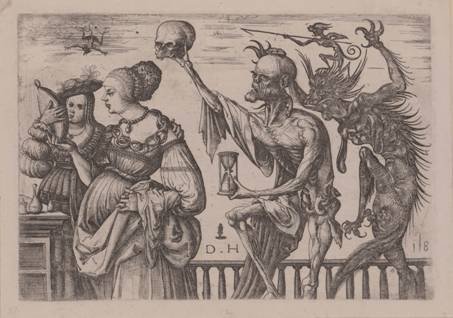Daniel Hopfer
dal 3/11/2009 al 30/1/2010
Segnalato da
3/11/2009
Daniel Hopfer
Pinakothek der Moderne, Munich
The exhibition displays the complete graphic of the Renaissance master from Augsburg, the inventor of the etching process. The Staatliche Graphische Sammlung itself possesses one of the world's most important collections of Hopfer's works. In addition to Hopfer's etchings on paper, a broad selection of woodcuts in the form of book illustrations, rare examples of his exquisite draughtmanship - of which only a few are known - and samples of his etchings on weaponry are also included in the exhibition.

From 5 November, 2009 until 31 January, 2010, the Staatliche Graphische Sammlung in the Pinakothek der Moderne will be exhibiting virtually the complete graphic œuvre of the Renaissance master from Augsburg, Daniel Hopfer (1471, Kaufbeuren–1536, Augsburg), the inventor of the etching process. The Staatliche Graphische Sammlung itself possesses one of the world’s most important collections of Hopfer’s works.
Thanks to his diverse talents, Hopfer, a contemporary of Dürer’s, was successful both as an etcher of weaponry as well as a draughtsman and designer of wooodcuts for book illustrations. Hopfer’s principal body of work, however, comprises 154 iron-plate etchings. His broad range of subjects includes religious, historical and mythological compositions, everyday scenes, portraits, architectural depictions, ornamental designs and elaborate letters of the alphabet. Prints with added texts, not unlike modern-day flyers, were used to spread Protestant ideals, and show the artist’s familiarity with the Lutheran body of thought. His copies of Italian masterpieces (by Mantegna, Raphael and Raimondi, among others) and variations on these themes are of far-reaching importance and their reproduction assisted the rapid spread of the Renaissance throughout Germany.
Daniel Hopfer’s prominence is ultimately due to his invention in the early 1490s of the (iron-plate) etching process. This process had been familiar to armourers for some time and used for the elaborate decoration of armour plate or swords by etching precisely with acid to produce incised ornamentation and figurative motifs that could then be blackened or gilded. Hopfer discovered that the areas eaten away by acid on plates that had been treated – or etched – in such a way, were able to hold ink and could be used to print copies on paper.
In addition to Hopfer’s etchings on paper, a broad selection of woodcuts in the form of book illustrations, rare examples of his exquisite draughtmanship – of which only a few are known – and samples of his etchings on weaponry are also included in the exhibition.
A catalogue of works, with explanatory texts, accompanies the exhibition. The publication is a comprehensive, illustrated catalogue raisonné of Hopfer’s prints (woodcuts and etchings, including several recently discovered individual sheets), as well as all drawings and weaponry etchings. As the Staatliche Graphische Sammlung München possesses almost all etchings by Hopfer, the publication is also a works catalogue of the holdings in Munich. Contributions by a number of authors on various aspects of Hopfer’s art and that of his sons, complement the catalogue.
Image: Daniel Hopfer | Death and the Devil Surprise two Women, iron-plate etching
© Staatliche Graphische Sammlung München | Photo: M. Gadiot
Further information and pictorial material available: tel. 089.23805-286 or
e-mail: pressebuero@pinakothek.de
Press Preview 4 November, 2009, 11h
Opening at 18.30h
Pinakothek der Moderne
Kunstareal, Barer Strasse 29, Munich
open daily 10-18 except monday
regular ticket 10 euro, reduced 7.50



